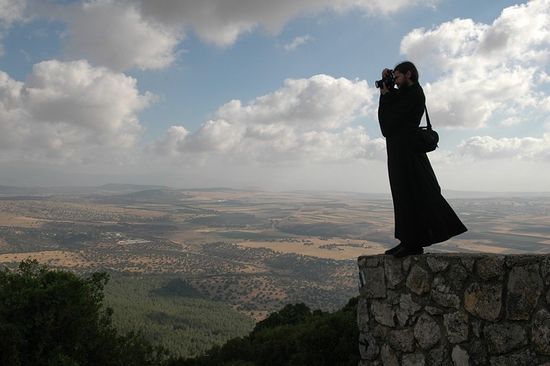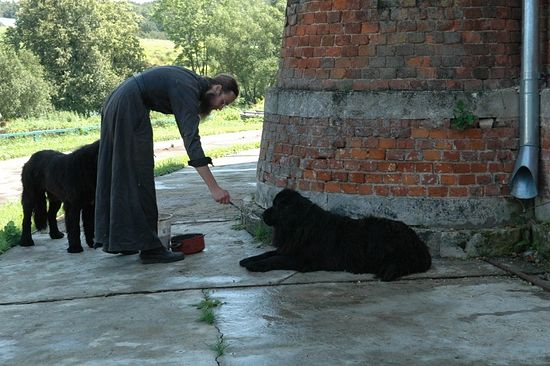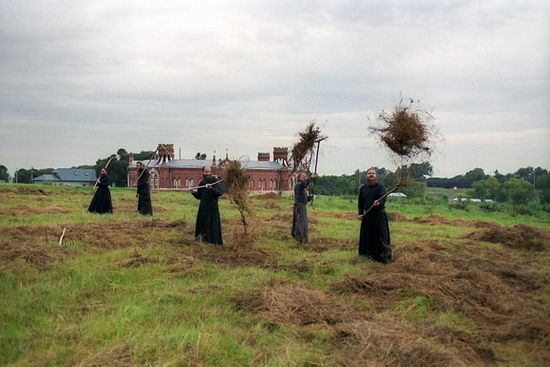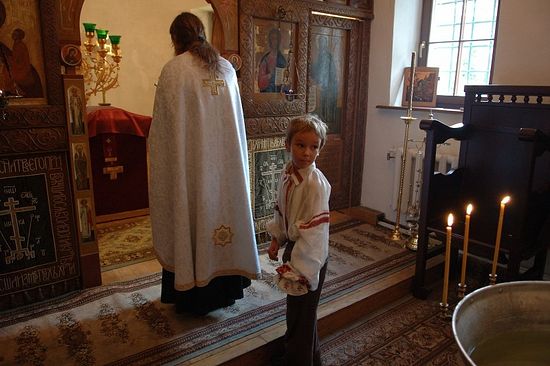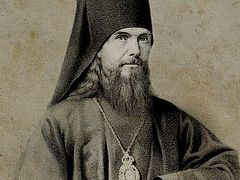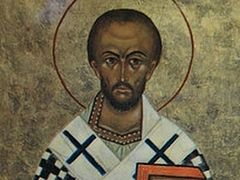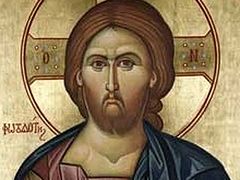Examining a passage from the anonymous second-century Epistle to Diognetus, Archimandrite Irenei explores the witness borne by the early Christian community and asks: does it reflect our Christian testimony today?
For our reflection this week I would like to offer up for your consideration a passage from an anonymous letter dating to the early second century or just possibly, the late first. It is a passage that has become well known in its own right on account of its singular beauty and the power of its testimony. The author of the text is unknown though often he is given the name Mathetes this, in fact, simply means “disciple” or “student,” and we know the text simply as The Letter to Diognetus. It is found in the collections of the Apostolic Fathers, from whom we have been recently reading here.
The Epistle to Diognetus is a text written recounting the lives of the Christians as they are beheld by others in the early communities. Parts of this are written from a first-hand perspective and accounting of the new Christian religion, parts of it are written as the perceptions of the outsider. And there is a remarkable passage that occurs in this anonymous epistle, describing the Christians as if from the outside. Those who have the text available—and it is certainly easy to find in printed volumes or on the Internet—will find this as Chapter Five of The Epistle to Diognetus:
The Christians are distinguished from other men, neither by country nor language, nor the customs which they observe. For they neither inhabit cities of their own, nor do they employ a particular form of speech, nor yet lead a way of life marked out by any singular worldly attribute. But inhabiting Greek as well as barbarian cities according as the lot of each of them has determined, and following the local customs with the respect to clothing, food, and the rest of their ordinary conduct, they display to us their wonderful and confessedly striking manner of life. They dwell in their own countries but simply as sojourners. As citizens they share in all things with others yet they endure all things as foreigners. Every foreign land is to them as their native country and every land of their birth a land of strangers. They are in the flesh but they do not live after the flesh. They pass their days on earth but they are citizens of heaven. They obey the prescribed laws and at the same time surpass the laws by their lives. They love all men though they are persecuted by all. They are unknown yet condemned. They are put to death yet they are restored to life. They are poor yet they make many rich. They lack and are in want of all things yet they abound in all. They are dishonored and yet in their very dishonor they are glorified.
That remarkable passage from the fifth chapter of the anonymous epistle to Diognetus—and I have slightly abbreviated it in the portion I have read—this is a most extraordinary extract. Every time that I encounter this text I think of it as a great shaming of my own Christian life. And there were times when the patristic sources, when the writings of the Fathers, or in this case the writing of an unknown person of the early Church served the holy and sacred task of doing precisely that—giving us that pin-prick of shame, of guilt, when hear such words as these and are forced to ask ourselves, “Would an outsider looking at my life, at our life, in our Christian example today, would they say such things?” Would they look at us living in the world, say as this author did, “They are known and marked out by their confessedly striking manner of life?”
In a world where we are told to blend in, to fit in, not to stand out but to be one of the crowd, one of the pack, despite far-flung claims of fostering individuality, this epistle reminds us that that the Christians did not desire nor strive to fit in. They strove, rather, to live lives marked out by their singularity of purpose and focus. The text is extraordinary in the way it articulates a unique manner of Christian life. It is clear the Christians were not about putting on a show. The early Church was not trying to garner attention by being overly demonstrative of its own ways and beliefs, rather, it live authentically according to its own understanding, beliefs and traditions. It lived within the state, within the country and yet every land was its homeland and no homeland was its own country. This is a remarkable thing for us to hear today with so many national divisions, national prides and national shames. We are reminded by the early church that to the Christian person every land is home because in every land we can find communion with God. And yet no land, even if it be our own homeland, is more than a foreign country for we are persons on a path, on a journey to our only true homeland, which is the Kingdom of God. “They dwell,” the author says, “in their own countries, but as sojourners, as visitors. As citizens they share in all things with others and yet endure all things as foreigners.”
There is a remarkable image here of the idea of a holy dispossession. In every land we struggle towards sanctity but we are neither bound by that land nor held captive by it. We are struggling on towards a higher calling. According to the specific conduct of their lives the author writes that “The Christians are in the flesh but do not live after it. They pass their days on the earth but they are citizens in heaven.”
Christian persons are called today, much as they were in the early church to live lives day to day in the world around us that make clear our true homeland. We are called to live in the world but not to be of the world, a very famous phrase. But what that means in early Christian testimony is that it is visible to other people, such as this anonymous author. Beholding Christian communities, it is visible and clear that their home—our home—is elsewhere. Our home is the Kingdom of God, the heavenly realm.
So our full engagement with the world does not shy us away from that testimony but is the very form and venue wherein our missionary testimony is born out. We obey the laws, we are told by the text, yet at the same time we must surpass the laws by our lives.
And then the remarkable and moving phrases to Christian relationship to others in the world:
They love all men but they are persecuted by all. They are unknown yet still condemned. They are put to death yet restored to life. They are poor yet make many rich. They lack are in want of all things yet they abound in all. They are dishonored yet in their very dishonor they are glorified.
In those moments where we feel that our own Christian life is hampered by the fact that we are too poor, that we are dishonored or shamed rather than given respect in the world around us—and how often do Christians lament in our modern day that the world does not respect us enough, does not pay enough attention to us, that we are side-lined in society—in these moments, in these observations a text such as this calls us to an awareness that in dishonor, there is glory, in poverty, there is wealth, in persecution there is the foundation to exercise love, in want there is great abundance. These seeming paradoxes spelt out by this author are nothing more than testimony born to the living example of precisely what Christ commands: “Blessed are you when men will revile you and persecute you.” ” Blessed are the poor.” “Blessed are the meek.” “Love thy neighbor”
What the author of this remarkable text has seen, what he bears witness and testimony to in his writings, our lives lived out in the commandments of Christ. Lives in which the blessedness to be found in poverty is visible to the outside observer, in which the love to be shown through hatred and through persecution is apparent to the world. In which the glory, which comes precisely through dishonor, is seen by the world itself. For it was in his apparent dishonor that Christ himself was glorified. The dishonor of the cross became the very tree, which bore up the King of all.
In all of these things, this anonymous second century text bears witness to lives truly lived in obedience to Christ’s command and shows us the fruit of that obedience, that outsiders, those who do not know the Christians from others, behold their manner of life and cannot but see it in reverent terms. This is the promise that awaits an obedient life. And when we hear these words let us take great joy and assurance because we know our life does not live up to this example. I am aware that when one looks at my life one does not say the sorts of things that the author here says of the early Christian’s life. And in precisely in such an awareness we are prodded forward. Let us rise up to the challenge. Let us embrace the seeming dishonor—the actual dishonor—of the world. Let us embrace poverty, physical as well as spiritual, that we may live lives known, witnessed, and born testimony to by others, as singular and striking.
May God allow this transformation to touch our hearts, in our own lives and in our families and in our communities and in our Church throughout the world.
May the prayers of our Holy Fathers, Lord Jesus Christ our God, have mercy on us and save us. Amen.
Transcript by OrthoChristian.com from a podcast on Ancient Faith Radio

